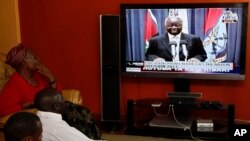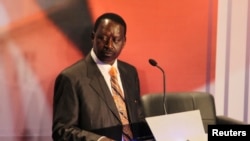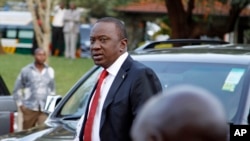NAIROBI —
Kenyan President Mwai Kibaki is urging Kenyans to vote peacefully in general elections next week. The race is down to the wire, with the two leading presidential candidates both predicting victory in the first round of voting.
In a televised address Friday, the outgoing Kenyan president said voters have a “date with destiny” Monday. “I also make a passionate plea for all of us to vote peacefully," he said. "Indeed, peace is the cornerstone of our development," he said.
Kibaki urged politicians to accept the results of the vote. He said “every election produces winners and losers.” The president is retiring after this, his second term in office.
He was re-elected in a disputed vote in 2007. Violence that followed that election killed more than 1,100 people and displaced more than 600,000.
The race this year is extremely close, with the current frontrunners separated by only a couple of percentage points in recent polls. If no candidate wins more than 50 percent of the vote, the race will go to a second round run-off.
Prime Minister Raila Odinga, the candidate for the CORD alliance, told VOA in a recent interview that he expects an outright victory.
“I don’t think that we will go for a run-off, I think we can win first round," he said.
His rival, Deputy Prime Minister Uhuru Kenyatta with the Jubilee alliance, is equally confident. The candidate has been urging his supporters to come out in force to also ensure a round-one victory.
Jubilee political strategist Moses Kuria says the numbers show his party has the race locked up in the first round.
“In some of our strongholds, the turnout has been traditionally very high and we expect it to be higher. Having said that, we are also looking at some really changing dynamics in even those polls, for example in the Coast region, where we have had a massive surge over the last 48 hours," he said.
Kenya has been deploying additional police forces across the country to keep the peace during the election. Rights groups have expressed concern about rising tension across the country ahead of the vote. On Thursday, Kenya’s police inspector general also said some instances of violence could occur.
In a televised address Friday, the outgoing Kenyan president said voters have a “date with destiny” Monday. “I also make a passionate plea for all of us to vote peacefully," he said. "Indeed, peace is the cornerstone of our development," he said.
Kibaki urged politicians to accept the results of the vote. He said “every election produces winners and losers.” The president is retiring after this, his second term in office.
He was re-elected in a disputed vote in 2007. Violence that followed that election killed more than 1,100 people and displaced more than 600,000.
The race this year is extremely close, with the current frontrunners separated by only a couple of percentage points in recent polls. If no candidate wins more than 50 percent of the vote, the race will go to a second round run-off.
Prime Minister Raila Odinga, the candidate for the CORD alliance, told VOA in a recent interview that he expects an outright victory.
“I don’t think that we will go for a run-off, I think we can win first round," he said.
His rival, Deputy Prime Minister Uhuru Kenyatta with the Jubilee alliance, is equally confident. The candidate has been urging his supporters to come out in force to also ensure a round-one victory.
Jubilee political strategist Moses Kuria says the numbers show his party has the race locked up in the first round.
“In some of our strongholds, the turnout has been traditionally very high and we expect it to be higher. Having said that, we are also looking at some really changing dynamics in even those polls, for example in the Coast region, where we have had a massive surge over the last 48 hours," he said.
Kenya has been deploying additional police forces across the country to keep the peace during the election. Rights groups have expressed concern about rising tension across the country ahead of the vote. On Thursday, Kenya’s police inspector general also said some instances of violence could occur.






